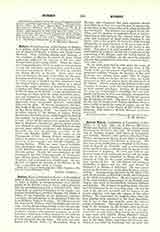

Hubert, JEAN-FRANCOIS, ninth Bishop of Quebec, b. at Quebec, February 23, 1739; d. October 17, 1799; son of Jacques-Francois, a baker, and Marie-Louise Maranda. After studying classics and theology at the seminary of Quebec, he waited six years before ordination, owing to the vacancy of the see, after Bishop Pontbriand’s death (1760). When the Americans besieged Quebec (1775), he urged several students to join the defenders, and harbored and fed both wounded and prisoners of war. In 1781 he solicited the Huron Mission at Detroit. There, after four years of ministry, the news of his choice for the coadutorship reached him. He was consecrated in 1786. In 1789 a group of English loyalists emigrated from the United States, planned the scheme of a mixed university, under the name of Royal Institution, for Catholics and Protestants alike, to be subsidized out of the revenues of the Jesuits’ estates, an organization investing the State with the entire control of education and destined to destroy the faith and nationality of French Canadians. Bishop Hubert, in spite of opposition from unexpected quarters, successfully thwarted the plan. Of his two coadjutors, the first, Msgr. Bailli de Messein, died in 1794, and was replaced by Msgr. Pierre Denaut (1795). To supply the dearth of priests caused by the change of regime, Bishop Briand had, for thirty years, vainly begged the British Government for permission to recruit the clergy in France. When the Revolution cast numerous French-men on England‘s hospitality, several exiled priests were allowed to enter Canada. Bishop Hubert warmly greeted these saintly auxiliaries, who replaced providentially the fast disappearing survivors of the Jesuit and Recollet Orders. In his report to the Propaganda (1794), Bishop Hubert mentions 160 priests, of whom 9 were in Nova Scotia and vicinity, and 4 in Upper Canada, and 160,000 Catholics, including Indians. While not more than 5 Catholics had apostatized since the conquest of the country, nearly 300 Protestants had joined the Church during the same period. Besides his two coadjutors, he had consecrated the first Vicar-Apostolic of Newfoundland, Bishop James O’Donel, O.S.F.; he had ordained 53 priests and confirmed over 45,000 souls. He was the first to suggest the division of his diocese, at the time vaster than the whole of Europe.
LIONEL LINDSAY

